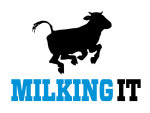A former chairman of the Meat Industry Action Group has since gone into dairy farming but is now standing for a seat on the Beef + Lamb NZ board.
Former sheep farmer John Gregan, who farms near Waimate, has converted from farming 7000 ewes to milking 950 cows over the last eight years.
Gregan says he and wife Cara were disillusioned with sheep returns which prompted their switch to dairying and they now run two non-irrigated dairy units at the foot of the Hunter Hills in South Canterbury.
Gregan believes the dairy and sheep and beef industries should be working closer together and this is part of the reason why he has thrown his hat into the ring.
"Beef + Lamb have been incredibly helpful to me throughout my farming career," he told Rural News. "I am now in a position where my industry and governance experience means I can give back by contributing at the board table."
Gregan says the most important issue currently facing red meat producers is twofold: a lack of profitability and the difficulty posed by the volatility in red meat prices.
He would like to see BLNZ continuing its "fantastic onfarm support" of beef and sheep farmers, and also forge a closer working relationship with DairyNZ.
"We need to be able to take full advantage of the mutual benefits the industries offer each other," Gregan says.
He is a strong supporter of BLNZ investing money in schemes like the RMPP (Red Meat Profit Partnership) and the Government-backed Primary Growth Partnership.
"Both schemes use farmer levy money to leverage other funding through Government and business partnership funding; so that is a smart way to get bang for your buck," Gregan explains. "The schemes are for best practice and learning from those who are succeeding. They are good initiatives."
He concedes it is hard to ensure that value from such investments is returned to farmers. "You can't over a short time," he says. "But the better farmers will always make sure they're well informed and will lead from the front by adopting what works, and this is soon picked up by the wider farming base."
A key reason Gregan is standing for BLNZ's board is to see more collaboration and cooperation between the red meat and dairy industries. As a convert from sheep to dairy, Gregan does not share some others' concerns about seeing more dairy conversions as sheep producers chase better returns.
"The two industries are becoming more and more connected through grazing, growing feed and leasing," he explains. "I suspect as that continues [the dairy and red meat sectors] will tend to rise and fall on the same tide."
He adds that a long term lack of profitability in any industry will cause farmers to look at their alternatives.
Gregan believes BLNZ's role in safeguarding better returns for meat producers will be by ensuring that farmers are maximising their onfarm efficiencies.
"I see any structural changes within the red meat industry itself needing to be led by groups like MIE and company shareholders. Many of the issues involved in a lack of profitability stem from the industry structure, an area Beef + Lamb isn't able to get involved in directly."
Currently the red meat levy goes in three areas – onfarm, in market and at the policy table. Gregan believes the bulk of money should be spent on farm.
"The difficulties of in-market spending is that the benefits may not flow back to the farmers who are paying the levy, so any in-market spending would need to be proven to increase the profitability of beef and lamb farmers," he says. "The same would apply to policy spending."



















